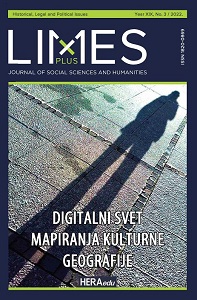DIGITALNE BIBLIOTEKE, OTVORENI PRISTUP I PONOVNO KORIŠĆENJE
DIGITAL LIBRARIES, OPEN ACCESS AND REUSE
Author(s): Gordana Ljubanović, Maja SimonovićSubject(s): Library operations and management, Electronic information storage and retrieval
Published by: HESPERIAedu
Keywords: digital libraries; digitization; cultural heritage; digitized objects; databases; open access; metadata; reuse; cultural industries; creative industries
Summary/Abstract: The rapid development of new technologies has resulted in all types of libraries being able to create their own digital collections. In addition to the universal availability of information, the main task of digital libraries is to collect, store and present cultural material. Given that digital libraries in Montenegro mainly operate within public cultural institutions, their way of work has succumbed to an outdated concept that results in passivity. This means they focus on collection and storage, while presentation is rarely, if ever, present. Nowadays, culture is treated as a part of the economy – within the cultural and creative industries – but cultural heritage remains unrecognized as a socio-economic resource. Modern technologies and new art theories have combined and are taking a turn by directly involving databases in the creative process. Using various examples of good practices within existing projects and platforms, it is possible to define the conditions for the reuse of digitized cultural heritage, as well as the direction in which policies and tools should be designed to achieve greater visibility. Cultural heritage can become a creative and economic resource only with Open Access, and with an insistence on quality content and metadata. Digitization and reuse of materials require institutions to redesign their pages, providing more metadata that includes narrative descriptions as well as their origins. When this type of metadata is available, the possibilities for further use expand, as it enables various interpretations, translations, and modes of application. Based on several successful projects and their results, it is easy to conclude that there are different ways to open collections and involve the local community, so that economic sectors become connected with digital heritage. The inclusion of digitized heritage in cultural tourism development projects would enable this industry to focus on smart tourism, which entails the inclusion of information technology in the creation of innovative tools for tourism development. Cultural and creative industries are already developed economic sectors in most Western countries, while in developing countries they are not even recognized as an independent sector with defined strategies. The inclusion of cultural heritage and digital collections in the development of these industries, in the spirit of modern world trends in the field of digitization, has come to the fore as the correct way to preserve and present traditions and materials of heritage institutions and to include them in the economy and education.
Journal: LIMESplus
- Issue Year: 2022
- Issue No: 3
- Page Range: 145-169
- Page Count: 25
- Language: Montenegrine

